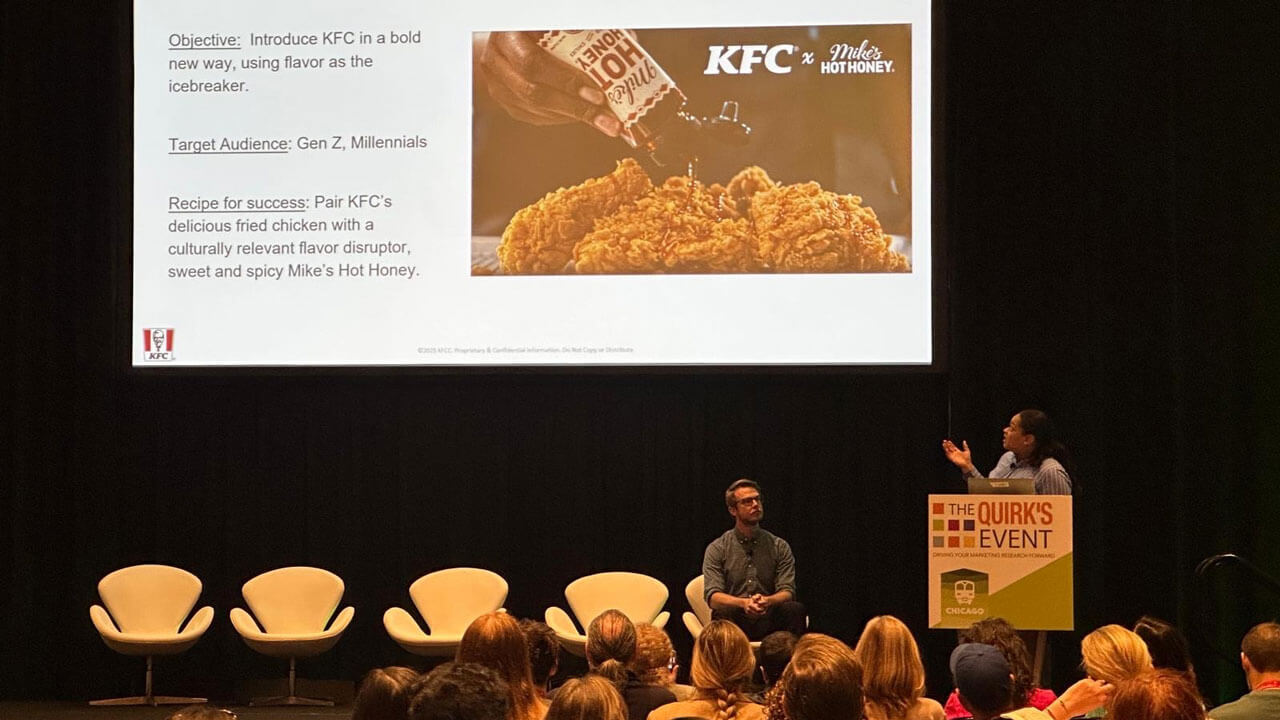Blog
Retailers have a key role to play when it comes to removing barriers to sustainability

Blog
More from our blog
-

The ghost completes of past, present, and future
Get an insight into how Cint has adapted to one of the biggest problems facing the market research industry.
-

Cint Exchange in 2025: A year of innovation
Looking back at a year’s worth of updates and improvements to Cint Exchange.
-

Lucid Measurement 2025: A year of change
Looking back on how we levelled up our measurement solution this year.
-

How the Cint Exchange offers superior scale and global reach
Learn more about the research marketplace where unmatched scale meets precise targeting.
-

Gifts or groceries: Exploring the impact of inflation on the global holiday season
Our latest report explores how consumers are coping with inflation as 2025 draws to a close.
-

-

-

Expert advice on monetizing your audience
Intrigued about audience monetization? Cint is here to help.
-

How the Cint Exchange helps you find insights in minutes not months
We explore why our research marketplace offers customers and the speed and ease they demand in 2025.
-

How Study Creator could change your campaigns for the better
Why wait days when you can launch in minutes?
-

Why smarter measurement is the key to maximizing ad spend
Read how leaders at Advertising Week New York mapped out the path to maximizing every ad dollar in 2025.
-

New documentary “The Answer Engine” unpacks the story of Cint
A new short-form documentary explores how our research technology is transforming how organizations gather insights from real people.
-

Discussing data quality at ESOMAR Congress 2025
Get the low down on what Cint CEO Patrick Comer and VP of Trust and Safety Jimmy Snyder had to say about combating fraud while protecting the respondent experience.
-

How to get high-quality survey responses
Want to know more about getting hold of high-quality survey responses? We’ve got you covered.
-

What is brand lift and how can I optimize it?
What is brand lift? The focus of brand lift studies is to measure the effectiveness of advertising campaigns. For people working with, for, or on the behalf of brands, a brand lift study helps with understanding how specific ad campaigns impact consumers’ perceptions of the brand in question. Brand lift studies measure perception in the…
-

What are consumer insights?
Get to grips with what consumer insights are, how they’re gathered, and how they can be used in market research and media measurement.
-

-

What are lift metrics in media measurement?
Learn how to calculate and measure ad recall, brand awareness, consideration, message association, and brand attribute lift to optimize your ad campaigns.
-

What is brand awareness?
Uncover the importance of brand awareness and the role it plays in brand lift studies.
-

“Too good to be true”: The illusion of quality in the age of AI-generated survey responses
Cint’s Jimmy Snyder explores how we’re entering an era where survey responses may be polished and articulate — but not necessarily real.
-

Data quality drives return on investment — here’s how
Learn how reliable, accurate survey data leads to stronger decision-making, better targeting, and optimized resource allocation for effective insights.
-

Why poor quality data poses risks in market research
Understanding the negative impacts of poor quality data on the research industry.
-

Part 2: Growing and monetizing your community with Cint Engage
Discover how Cint Engage can simplify and scale your operations.
-

Does consumer-centric innovation really need survey data anymore?
Cint’s Wilson Peters (VP, Global Customer Success) and Delineate’s James ‘JT’ Turner (Founder and CEO) discuss the importance of research when it comes to connecting with consumers.
-

Part 1: Growing and monetizing your community with Cint Engage
Struggling to turn your audience or community into a reliable revenue stream? Find out how Cint Engage can simplify and scale your operations.
-

What is a survey in market research?
We explain what surveys are, how they function, and why they’re crucial for driving strategies and assisting with business decisions.
-

Say hello to Cint Engage, your new secret weapon for audience monetization
Step into a new era of audience monetization and panel management.
-

What’s the the true cost of rest and relaxation in 2025
Our latest report looks at the impact that inflation is having on travel planning for consumers across the globe.
-

Read our new report on in-game advertising now
Our latest report explores what consumers make of in-game advertising and why it presents a new frontier for advertisers.
-

Say hello to Luci, Cint’s new AI study companion
Built with customers of Lucid Measurement in mind, Luci could be your new favorite AI assistant.
-

Exploring AI, ethics, and data quality
AI isn’t going anywhere, so how do researchers incorporate it ethically and with quality in mind?
-

Why continuous research is the unsung hero of an uncertain world
Cint’s Ben Hogg extols the virtue of continuous research.
-

How are consumers coping with inflation in 2025?
Our latest report examines how the average consumer is faring against a backdrop of inflation and financial uncertainty.
-

The best ways to find the right respondents for your survey
How do you make sure that your survey gets in front of the right respondents? Our latest guide explains all.
-

What is a ghost complete?
Learn what ghost completes are, why they’re an issue, and what Cint is doing to combat them.
-

Cint Verified Audiences now available in Snowflake
Learn more about how Cint and Snowflake’s partnership breathes life into customer intelligence.
-

Making the most of insights in a rapidly changing world
Savanta’s Dr Nick Baker and Cint’s Ben Hogg sat down for an enlightening fireside conversation at Quirks London, 2025
-

AI is altering the media measurement landscape – here’s how
Discover how Lucid Measurement by Cint uses automation for streamlined media measurement opportunities.
-

Localized insights for global success
Download our latest whitepaper to discover how capturing local data can spark global breakthroughs.
-

Embracing inclusivity in market research
Explore how survey design, inclusive language, and community engagement can help us create research that reflects the full diversity of human experience.
-

How real-time brand lift helps advertisers thrive in uncertainty
Director of Product Management at Cint, Stephanie Gall, joined the EMARKETER podcast to discuss how to make better campaign decisions in periods of flux.
-

What is a velocity attack?
Learn what velocity attacks are, why they’re an issue, and what Cint is doing to combat them.
-

What is a click farm?
Understanding what click farms are, how they operate, and how they can be combated.
-

Doing more with less: how measurement is adapting to a changing world
Feeling the pinch but still need to deliver? A panel of experts headed by Cint’s Laura Manning discuss strategic approaches to media measurement during a period of flux.
-

Cint is now one of Newsweek’s Most Loved Workplaces
We’re delighted to appear on Newsweek’s 2025 Global Top 100 Most Loved Workplaces list.
-

Read our guide on the best ways to improve existing qualification data and screening questions
Experts discuss how to ensure your survey’s quotas and qualifications are helping you get accurate insights in our latest guide.
-

How KFC uses insights to drive flavorful innovation
Understanding why, for one brand at least, quality + flavor + value = the recipe for success.
-

Quarter-century crisis: Are we better or worse off than we were 25 years ago?
Live at the Advertising Week Europe event in London, April 2025, Advertising Week’s Katie Ingram and Cint’s Ariel Madway took the stage to unpack generational divides.
-

Polling in the age of upheaval: How survey science is adapting to chaos
Cint’s Matthew Braithwaite joined Michael Conte of Marist Poll to dive into some of the tricks of the trade.
-

Breaking barriers: Carving my own path
Read the winning entry from Elevate & Inspire, a competition run as part of our Women @ Cint India initiative.
-

Common problems, Cint solutions
Let’s tackle your biggest research fielding hurdles—here’s how we do it.
-

Effective strategies for combatting fraud in the Restech industry
Fraud is an ongoing issue in the research and insights space. Here’s how buyers and suppliers can fight back.
-

12 best practices of survey design
Survey design can have a dramatic impact on the quality of your research. Download our guide to find out how to improve survey experience for respondents and reduce drop-off rates.
-

Getting to the point: Faster insights now for better outcomes later
Ed Stone, Cint’s Director of Data Solutions & Measurement gives us the lowdown on how to do more with less in the ever-evolving measurement landscape.
-

A full-stack guide to monetizing your audience
Want to monetize your audience but don’t know where to start? Read on to get the lowdown.
-

Making the most of the industry’s biggest marketplace as a buyer
Discover how the Cint Exchange operates and why it could benefit your business.
-

Cint raises 596 million SEK to support new strategy
Cint CEO Patrick Comer discusses Cint’s recent successful Rights Issue
-

Soothing cross-platform measurement challenges for marketers in 2025
Christopher Pope, Senior Director, Data and Measurement at Cint talks us through marketer concerns and how to solve them.
-

Making the most of the industry’s biggest marketplace as a supplier
Generate revenue and reward your members with ease by connecting to the world’s largest marketplace as a supply partner.
-

A practical guide to integrating Restech into your tech stack
Here’s how to boost your research practices with Cint.
-

What is the difference between a brand tracker and brand lift study?
Brand trackers and brand lift studies are valuable insights tools for measuring consumer sentiment about a brand. Let’s explore what makes these types of studies unique and how they can most effectively be applied to your needs.
-

How to engage and retain diverse respondent supply
Survey research can’t happen without survey respondents. So how can panels and researchers ensure that respondents have a positive experience?
-

Why is data quality so important when it comes to programmatic research?
Two experts explain why when you’re working with programmatic research, quality is key.
-

Are streaming habits reshaping the advertising industry?
Our latest report explores the relationship between streaming and advertisers ahead of 2025’s Upfronts.
-

Fighting bots with bots: how to combat AI-driven fraud
Cint’s Jimmy Snyder, Vice President of Trust and Safety, and Shelby Downes, Senior Program Manager, discuss a range of approaches for taking action against the bots.
-

How can the market research industry act ethically in 2025?
A panel of experts voice their opinion on how market research and insights professionals can foreground concerns around ethics in the year ahead.
-

What are the challenges facing market researchers in 2025?
A panel of experts voice their opinion on what difficulties insights professionals need to be aware of in the year ahead — and how best to approach them.
-

Where will the market research industry take AI next?
A panel of experts voice their opinion on how market research and insights professionals will continue to foreground automation in their methodological approach.
-

Lucid Measurement 2024: a year of innovation
Read a recap of what we added to Lucid Measurement in 2024, and enjoy a sneak peek of where we’re going in 2025
-

What does the market research industry make of AI and synthetic data?
Introduction Across the market research industry, more and more organizations and companies are using AI to speed up audience insights analysis. The reason is simple: AI can streamline previously lengthy processes. Formerly time-consuming work can now be done in seconds, with human beings on hand to ensure accuracy. AI tools save time and money but…
-

4 ways in-flight measurement can help stretch your marketing budget
Knowing how to prioritize your limited budget while increasing the impact of your digital advertising will make the difference between success and just getting by this year.
-

Building the right tech partnerships: KFC U.S. and Cint’s ‘Finger lickin’ good’ recipe for success
At TMRE 2024 in Orlando, KFC’s Renee Reeves joined Cint’s Ryan Fletcher for a fireside chat on how building the right tech partnerships is the (not-so-secret) recipe for fostering a culture of innovation and setting your insights team up for success.
-

Surviving party season: CintSnap explores festive fatigue
Ready for a slew of parties, or dreading the prospect? Cint explores consumer attitudes toward a potentially massive month of social outings.
-

Eat, shop, repeat: CintSnap delves into Thanksgiving consumer trends
We examine the relationship between Thanksgiving and one of the biggest sales events of the year, Black Friday Cyber Monday (BFCM).
-

How Cint uses gender neutral language in job advertisements
We speak with Andy Perricone, Senior Talent Acquisition Manager at Cint to find out how Cint avoids gendered language in job ads, why it matters, and how we foster inclusivity that attracts the top talent from all genders and backgrounds.
-

Preparing for 2025: Insights on marketing and data collaborations
In 2025, global advertising spend is predicted to surpass $1 trillion—a milestone so monumental it could stretch dollar bills to the sun and back. However, beneath this record-breaking number lies a complex reality: while data is abundant, marketers and agencies still face significant challenges in unlocking its full potential. A recent research collaboration between Lotame…
-

CintSnap survey uncovers 2024 holiday travel trends and the use of AI in travel planning
As the festive season approaches, travelers worldwide are packing their bags for one of the busiest travel periods of the year – but not without a little help from technology. If the idea of using AI as your personal travel assistant sounds appealing, you’re not alone. This year, holiday travel trends reveal not only a…
-

John Lewis tops the tree in the Christmas ads anticipation stakes
The advertising industry’s biggest few weeks of the year are here. What do UK viewers and consumers want from their Xmas ads?
-

How popular is the poppy in 2024?
Ahead of Remembrance Day, Cint asks whether or not wearing a poppy is still a big deal in the UK.
-

Get to know our latest tool for brand lift studies: Study Creator
Find the full lowdown on Cint’s Study Creator tool, including the workflow process, benefits, and our latest video tutorial.
-

CintSnap explores US viewing habits ahead of the election
A huge election is also a huge moment for broadcasters. How will Americans be tuning into election night 2024?
-

TikTok, Deepfakes, and Political Ads: A study on the relationship between media and the upcoming election
Cint and Advertising Week partnered on research looking into the relationship between media influence and voter behavior leading up to this year’s US and UK elections.
-

Cint Trust Score – Inside the thinking AI brain
Cint’s experts break down the importance of our Trust Score model
-

CintSnap uncovers US and UK consumer Halloween 2024 spending habits and traditions
We take a look at the difference in spooky, seasonal spending habits and traditions in the US and the UK.
-

Step into a new era of the Cint brand with us
Find out how the Brand team used visual cues and language to bring the new brand vision to life.
-

The festive shift: How Diwali is driving India’s digital transformation across four key sectors
From ordering food online to the rise in quick commerce, our comprehensive Diwali survey reveals how technology is reshaping the way people prepare for and celebrate Diwali.
-

Getting the work-life balance right: Cinters share their hobbies outside of work this World Mental Health Day 2024
From carnival chasing to pilates, and kitesurfing to kickboxing, our international employees at Cint talk about how their hobbies keep stress under control.
-

Introducing Women@Cint
Cint is committed to making ourselves a more diverse and inclusive workforce. Here’s how we’re making that happen.
-

CintSnap takes a deep dive into the 2024 Formula One World Championship frenzy.
It might be the world’s premiere motorsport, but has F1 truly caught the attention of audiences in the US, UK and Australia?
-

How data-driven decision making is revolutionizing industries
A conversation with France Lasnier, SVP, for UK, France, Central Europe and Louis Nix, Senior Analyst, Product Operations, on the importance of a data-driven approach for companies.
-

How Cint keeps your data safe — and secure
A conversation with Cint experts Dhruv Mathur, Vice President, Information Security and Caroline Tahon, Data Protection Officer, on keeping data as safe and secure as possible.
-

Cint helps Push Digital uncover gaps in voter support and form insights to optimize targeting
Push Digital, a campaign agency active in America’s highest stakes races and debates by leveraging their digital expertise to start conversations, persuade audiences, and turn out voters, partnered with Cint on a study to uncover gaps in voter support.
-

Did you have a Brat summer?
Charli XCX might have dominated airwaves this summer, but how did the Brat campaign impact consumer habits?
-

Notting Hill Carnival 2024: CintSnap reveals UK sentiments around main attractions, sustainability, and diversity initiatives
Using CintSnap, we surveyed 300 UK respondents on how they plan to engage with the iconic celebration and what aspects of the event excite them the most.
-

Paralympics 2024: CintSnap reveals UK consumer insights on viewing habits, the most popular sporting events, and brand sponsorship
Using CintSnap we surveyed 300 people in the UK on how they plan to engage with the Games, most watched sports, and how brand sponsorship is perceived.
-

Back-to-school Survey: How Americans are preparing for the new school year ahead
Using CintSnap, we surveyed 300 Americans to reveal some trends and preferences on how they gear up for the academic year ahead.
-

The Booker Effect: Do literary prizes influence reading — and spending — habits?
Using CintSnap, we conducted a poll with approximately 300 people from the UK to explore what they read, how they read, and what persuades them to take a punt on a new title.
-

Guide to measuring political advertisements with Lucid Impact Measurement
Explore our guide to measuring political advertisements by Cint’s in-house expert Chris Pope, Senior Director of Measurement.
-

‘We Hear You’ – Cint Exchange launch with Lindsay Fordham
Discover the latest platform developments at Cint with Lindsay Fordham, SVP, Product.
-

2024 Paris Summer Games
With the 2024 Paris Summer Games underway, Cint surveyed 400 French people to gauge sentiments around the world’s largest sporting event.



































































































